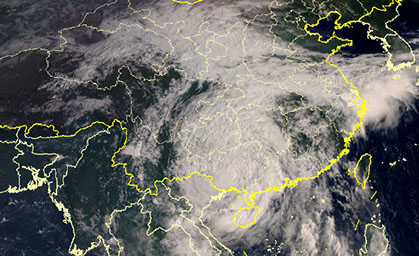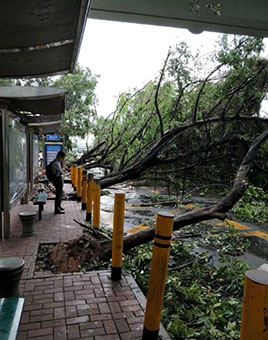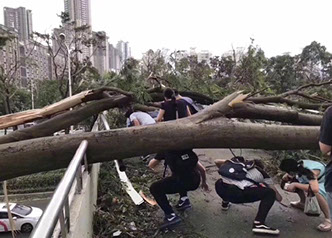
The Typhoon Mangkhut
By Katelynn Wang
Typhoon Mangkhut hitting Southern China on September 16 this year is considered to be the strongest one in recent years, with its highest central wind speed of 33m/s (level 12). Students at the University of Macau (UM) had been frightened and anxious over the week before it came on a Sunday owing to the tragedy displayed in UM and Macao last year under the influence of Super Typhoon Hato. Fortunately, Macao, along with Hong Kong and Guangdong Province, recovered well and quickly from the disaster this time and UM began its classes only two days after it.

When Typhoon Hato hit Macao last year, UM was out of electricity and water. I clearly remembered spending a long night by chatting with friends with lighted candles. Hato directly landed in Zhuhai at noon of August 23, while the Macao Government had not put on Signal 8 until 9 am. The unexpected strong wind brought devastating harm to both city and the bus stations near the customs in Macao which have not been rebuilt yet. With its electronic, water and traffic system paralyzed over days, Macao was in an extreme adversity, engraving the event of Hato in people's psyche.
Thanks to the lesson of Hato, Macao smoothly pulled itself through the adversity by taking five measures beforehand, including using the public broadcast to let out the warning signal of execution, sending emergency messages to citizens to warn them of the approaching of red storm signal, having the news host launch the most recent information of Typhoon for the first time and so on.


Wang Yuqing, a Year 4 student of UM who stayed on campus said she had a comfortable rest during the storm in her dormitory with an undisrupted supply of electricity and water.
Having learnt about the harm of Hato, I escaped from UM to Shenzhen on Friday evening and witnessed a whole stop of running of the city on Sunday. Being imprisoned at home, I browsed Weibo and read the messages from the weather bureau of Shenzhen, whose responsible and humorous staff kept interacting with citizens throughout the duration of Mangkhut. I was deeply moved by these people working for our safety and hope they will not be forgotten even after the disaster.
Despite being stronger than Hato, Mangkhut did not bring much loss to Southern China. According to the statistics, only about 60,000 trees fell down, 90% fewer than last year. That reasonable measures were taken beforehand is the most crucial and can be well proven this time.

BACK
Copyright © Umac Bridges Fall 2018